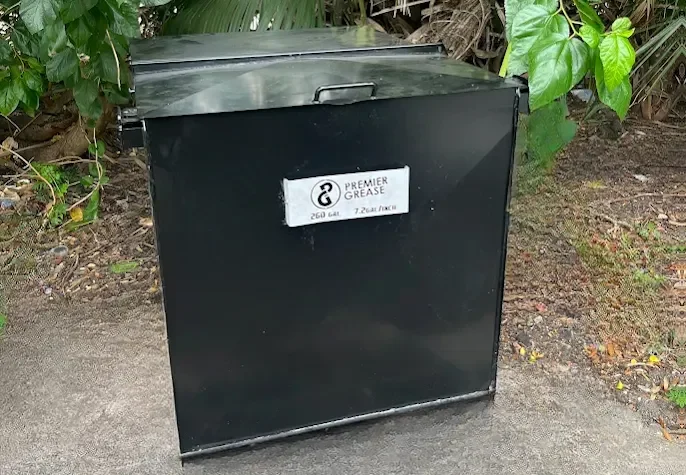Used Cooking Oil Recycling Services - Premier Grease
Premier Grease provides used cooking oil recycling services, using certified equipment to safely collect, process, and recycle your used cooking oil. We offer efficient, environmentally responsible solutions tailored to the food service industry’s needs. With years of experience in grease management, we specialize in maintaining compliance and promoting sustainability by using top-tier equipment that meets the highest industry standards. Choosing us means partnering with a company committed to safety and eco-friendly practices throughout every step of the used cooking oil recycling process.

Premier Grease Saves You Time & Money
We Require No Contracts and Trust That Our Services Will Keep You Coming Back
Welcome to Premier Grease, where we provide top-tier grease management solutions to keep your commercial kitchen running smoothly. Our expert services in hood cleaning, used cooking oil recycling, and grease trap cleaning are designed to ensure your kitchen remains safe, efficient, and compliant with all regulations. Whether you’re in need of routine maintenance or urgent service, our experienced team is dedicated to delivering reliable solutions to meet your specific needs.
- 24+ Years Experience
- Satisfaction Guaranteed
- Licensed, Bonded, Insured
- Free Estimates & Consultations
- Reliable Services You Can Count On
Send Us A Message
YES! We Reply To These Messages ASAP!
Our Used Cooking Oil Recycling Services Include:
Efficient Collection of Used Cooking Oil
Safe and Environmentally Friendly Disposal
On-Site Oil Filter Services
Premier Grease offers on-site oil filtration to help extend the life of your used oil. We ensure that the oil is properly processed and filtered, enabling its safe recycling or reuse. This service helps to maintain a cleaner and more sustainable kitchen environment. Explore our filter exchange services.
Custom Recycling Solutions
Ongoing Monitoring and Maintenance
Benefits of Used Cooking Oil Recycling
1. Environmental Impact Reduction
2. Cost Savings for Your Business
3. Regulatory Compliance
4. Energy Production through Biofuel
5. Improved Kitchen Efficiency
Why Choose Premier Grease For Used Cooking Oil Recycling?
Professional
Our team of professionals brings years of experience in used cooking oil recycling. We ensure that all processes are handled efficiently and in full compliance with safety and environmental standards.
Recycling Solutions
We offer a full suite of services, including oil collection, filtration, and conversion into biofuel, providing a tailored recycling plan to meet your specific business needs.
Environmental Sustainability
Recycling used cooking oil into biofuel reduces reliance on fossil fuels, contributing to global sustainability efforts and helping your business minimize waste.
Reliable & Efficient
We offer reliable, efficient used cooking oil collection and recycling services that work around your business hours, ensuring minimal disruption and compliance with regulations.
Safety & Compliance First
We prioritize safety, following the highest standards in oil handling and disposal, ensuring full compliance with local, state, and federal waste management regulations.
Our Used Cooking Oil Recycling Process
1. Collection of Used Cooking Oil
2. Filtration and Processing
3. Conversion into Biofuel
How to Dispose of Used Cooking Oil Properly
What Are the Risks of Improper Cooking Oil Disposal?
Common Mistakes in Cooking Oil Recycling and How to Avoid Them
Mistake #1: Using Improper Containers for Storage
Mistake #2: Allowing Contaminants to Mix with the Oil
Mistake #3: Neglecting to Schedule Regular Pickups
Mistake #4: Pouring Oil Down Drains
How to Keep Cooking Oil Storage Containers Clean
Why Used Cooking Oil Shouldn’t Be Poured Down the Drain
What Happens to Used Cooking Oil After It’s Collected?
How Does Cooking Oil Recycling Work?
What Are the Legal Requirements for Disposing of Used Cooking Oil in Georgia
Use Licensed Oil Recycling Companies
Maintain a Grease Disposal Log
Avoid Dumping Oil Down Drains
How to Find Reliable Cooking Oil Collection Companies
Check for Proper Licensing and Certification
Reputation and Reviews
Experience and Expertise
Convenient Pickup Schedules
Proper Disposal and Recycling Methods
Ensure that the company uses sustainable and environmentally-friendly methods for recycling used oil. Ideally, the collected oil should be repurposed into biodiesel or other useful products, reducing waste and contributing to eco-friendly solutions.
Competitive Pricing and Transparency
For reliable and efficient cooking oil collection in Georgia, Premier Grease is the perfect choice. With years of experience in the grease management industry, we have built a reputation for providing dependable and professional services to restaurants and commercial kitchens across the region. Our team is equipped with certified, high-efficiency tools designed to safely collect and transport used cooking oil, ensuring it is disposed of responsibly and in compliance with local regulations. At Premier Grease, we prioritize sustainability, offering an eco-friendly solution that reduces your environmental footprint while keeping your kitchen operations running smoothly. Trust us to handle your used cooking oil collection, so you can focus on delivering exceptional food and service to your customers.
Start Recycling Your Used Cooking Oil Today
Premier Grease is your certified partner for used cooking oil recycling, providing efficient, environmentally responsible solutions tailored to the needs of the foodservice industry. As experts in grease management, Premier Grease specializes in safely collecting, processing, and recycling used cooking oil, using certified and efficient equipment that meets the highest industry standards.
Frequently Asked Questions
1. What happens to the used cooking oil once it’s collected?
2. How often will Premier Grease pick up my used cooking oil?
3. Can I store my used cooking oil for long periods before disposal?
4. Is there any risk of spills or leaks during the collection process?
5. What are the benefits of converting used cooking oil to biofuel?
Converting used cooking oil to biofuel helps reduce reliance on fossil fuels and contributes to producing cleaner energy. It also supports the shift to renewable energy sources.
6. Where does Premier Grease provide used cooking oil recycling services?
We serve businesses in Atlanta, Savannah, Jacksonville, and Orlando, each with a 100-mile service radius. Please contact us to confirm if we can serve your specific location.


